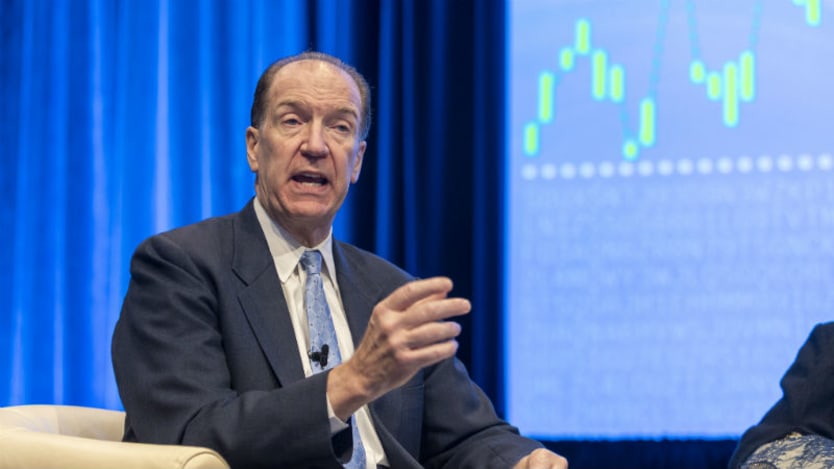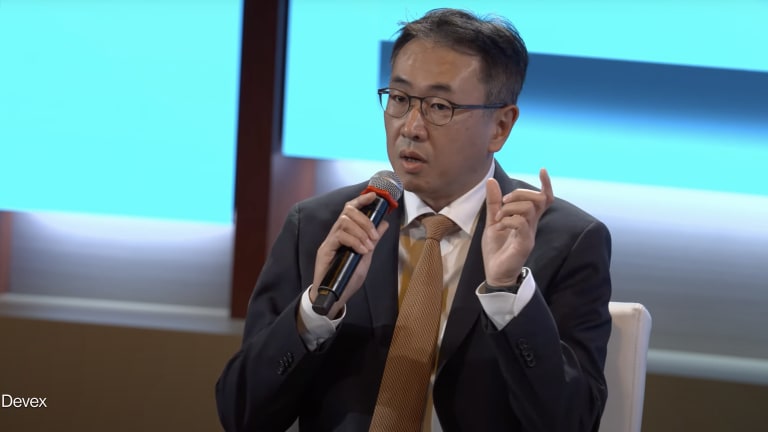
WASHINGTON — David Malpass, who has been the president of the World Bank for seven months, is not a big fan of international development conferences. He has said so on several occasions, including again last week.
“What we’ve wanted to focus on is getting the job done in countries. I’ve not been wanting to spend so much time in the conferences, but more time with the countries ... because our commitment and our mission, I think, is quite clear,” Malpass said at the Center for Global Development in Washington, D.C. on Tuesday.
In October, Malpass offered similar views about the World Bank’s own annual meetings.
“I’ve tried diligently to counteract the tendency of the annual meetings to expand to fill all available space, but I recognize the strength of inertia,” he said in a speech at McGill University in Montreal.
“What I hear Malpass saying is something that, to me, harkens back to the 1980s, which is that the development challenges in these countries are linked to governance issues.”
— Luiz Vieira, coordinator, Bretton Woods ProjectAt the annual meetings in October, one of Malpass’ first public appearances was at an event focused on increasing countries’ economic growth. He shared the stage with three ministers from low- and middle-income countries and almost immediately deferred the first question he was asked — about why he thinks economic growth is so important — to them.
“What I’ve been doing a lot of is trying to work with specific country programs on the policy changes that they could make and also the programs that the bank can do, the projects in countries that directly reduce poverty,” Malpass said.
“I don’t want to dominate, so I wonder if — can we go to each of the countries and see what their thoughts are on what works as far as creating faster growth in your countries,” Malpass said.
The new president’s approach appears to contrast sharply with that of his predecessor, Jim Kim, who resigned in January in the middle of his second term. Kim was known for orchestrating high-visibility moments and initiatives — often alongside celebrities or business titans — and for speaking about health, poverty, and climate change as urgent global challenges, as opposed to issues that should be tackled on a country-by-country basis.
For some observers, the return to ground level is a positive signal.
“It's actually quite welcome that the highest levels of the bank are now focused on how to do a better job at the country level, because maybe that's not been that much of a focus recently, and I think it's good for the pendulum to swing that direction,” Masood Ahmed, president of the Center for Global Development, told Devex.
“Vision without implementation is a daydream,” Ahmed said.
At the same time, while Malpass is not alone in questioning the return on investment from international conferences with unclear objectives, there is some concern that if the bank’s president focuses too narrowly on individual countries, the institution might lose its influence on issues that transcend borders and require global cooperation.
When it comes to the issue of fragile and conflict-affected states, for example — an issue which the bank will address in a new, comprehensive strategy expected in the next few months — the World Bank is not just speaking about one particular state, but also about the global challenge of fragility.
“You're talking about a collective issue that we face as the international community and what can best be done to find better ways to support that set of countries and situations in countries that are common to that,” Ahmed said.
Climate change presents another obvious example. As a collective action problem, climate change requires that nations agree on shared approaches to mitigating greenhouse gas emissions and supporting adaptation — for example, by mobilizing $100 billion for developing countries, a common goal that the bank can play a key role in supporting.
“At certain moments and on certain issues, I think leadership at the top of the World Bank can play a role that others cannot play at a lower level,” Ahmed said.
“Like all pendulum swings, it's equally important to recognize that the right place for them to settle is not at either end,” Ahmed said.
For others, a drawback of only focusing at the country level is that it places the responsibility for development — or persistent poverty — solely with the country itself, while potentially ignoring the fact that issues like poverty, conflict, and vulnerability might have structural roots within the global economy.
“What I hear Malpass saying is something that, to me, harkens back to the 1980s, which is that the development challenges in these countries are linked to governance issues, and a lack of finance at the local level for small scale entrepreneurs, etc.,” said Luiz Vieira, coordinator at the Bretton Woods Project.
Vieira added that while those things are by no means irrelevant, the lack of attention to global, structural issues is “puzzling,” given the increasingly integrated nature of the world economy and a broad recognition — including by groups like the World Economic Forum — that global capitalism must be reimagined.
Given that Malpass has been in the job for less than a year, outsiders should be wary of trying to draw too many conclusions about the direction he plans to take the institution, Ahmed said. The World Bank is also a huge institution that does not immediately change course with the arrival of a new president.
“These are big supertankers. I don't think they move so quickly,” Ahmed said.
Malpass has also not completely abandoned the conference circuit. Earlier this month the World Bank president joined other politicians and business leaders at Saudi Arabia’s investment conference — known as ‘Davos in the desert.’
Last year, Jim Kim chose not to attend that particular conference, due to the global condemnation of the Saudi government’s apparent role in the murder of journalist Jamal Khashoggi.








